Goats
Ultimate Guide to Keeping Pygmy Goats as Pets
Miniature Pygmy Goats
Ever-growing in popularity, miniature goats are finding their way into the homes and hearts of countless people.
These cute animals make great family pets and bring endless amounts of entertainment and companionship.
One of the most common breeds of miniature goats is the Pygmy goat. The breed is thought to have originated in West Africa and is genetically dwarfed.
Once domesticated, Pygmy goats were commonly used in zoos and for animal research.
People fell in love with this friendly goat breed, and private breeders started to sell them as companion animals ever since.
Some families show their goats or go on to breed them. They can even be used for dairy or meat. Not sure whether Pygmy goats are right for you? Read on and find out!
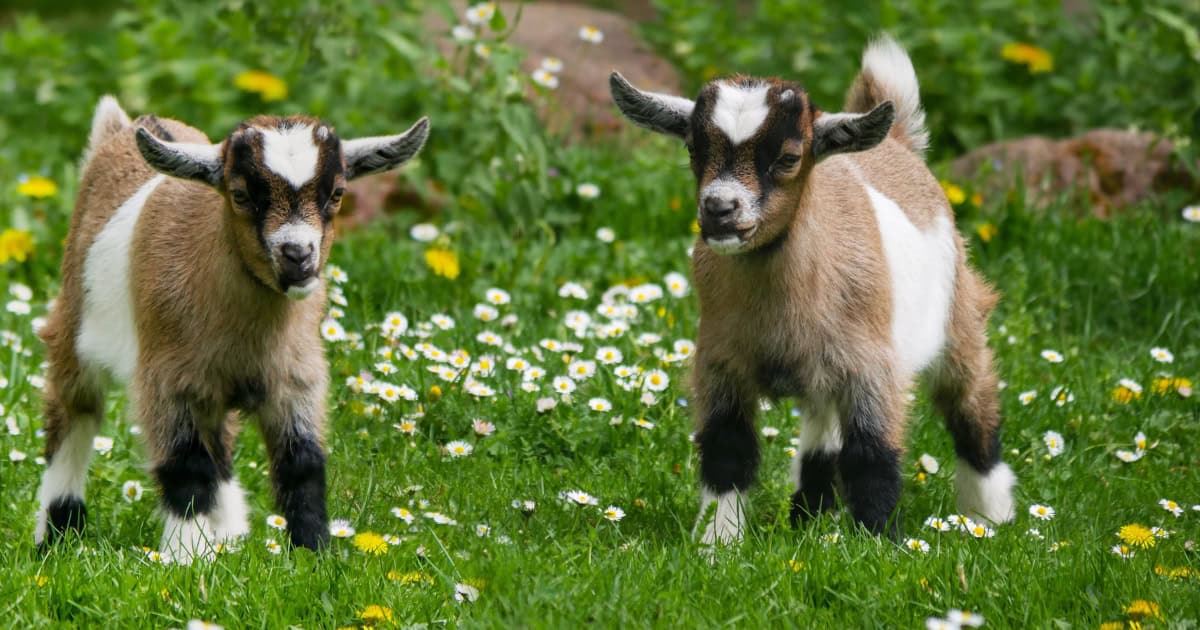
Keeping Pygmy Goats As Pets
Pygmy goats make great pets for people of all ages, from children to the elderly. Unlike other pets, miniature goats don’t bite, kick, or scratch.
They also don’t take much skill to handle. This makes them excellent safe pets for everyone.
Pygmy goats are fun, active animals.
They don’t require constant human companionship but are typically very friendly. You cannot have just one pygmy goat though – these herd animals need other goat companions to be happy.
The Pygmy breed is very hardy and can virtually adapt to any climate. They do need a large fenced outside area though to roam and play.
Pygmy goats live to play.
They spend most of their days clowning around, dancing and jumping all over the place. They can get bored very easily, so you’ll need to be creative when setting up an area for them.
Popular things to put in their play areas are wood stumps, pallets, or anything they can climb on or jump from.
Another thing to consider when adopting Pygmy goats is the area that you live in.
Consult your local Council for any regulations regarding keeping miniature goats on your property.
Pygmy goats can be very loud so it might be a good idea to chat with your neighbours if you live in a suburban area.
Keeping Pygmy Goats with Chickens
Goats and chickens typically get along very well and are happy to share the backyard.
The biggest problem you’ll face is when it comes to food. Your Pygmy goats will love to steal your chook feed, but it’s extremely important to keep them away!
Chook feed can give goats diarrhea and boat, and in severe cases could be fatal.
The easy way to avoid this is to keep your chook feed in a separate area from the goats, such as inside their coop.
Make sure that the coop has an opening small enough that your Pygmy goats can’t get into. A great option is to use an automatic chook feeder.
The Somerzby Chicken Feeder is specially designed for only chooks to open, and to minimise food spillage.
Another thing to be mindful of is that your chooks and goats both need a separate area to sleep.
Having a designated chicken coop and a separate sleeping area for goats will keep your animals happy.
This will also help your miniature goats stay disease free, as salmonella bacteria can be spread by chicken droppings.
Keeping goats and chickens together is a rewarding experience, as both animals provide companionship and can form strong bonds.
Chickens will also help keep things clean by picking up dropped grains from your goats and eating any bugs and parasites around.
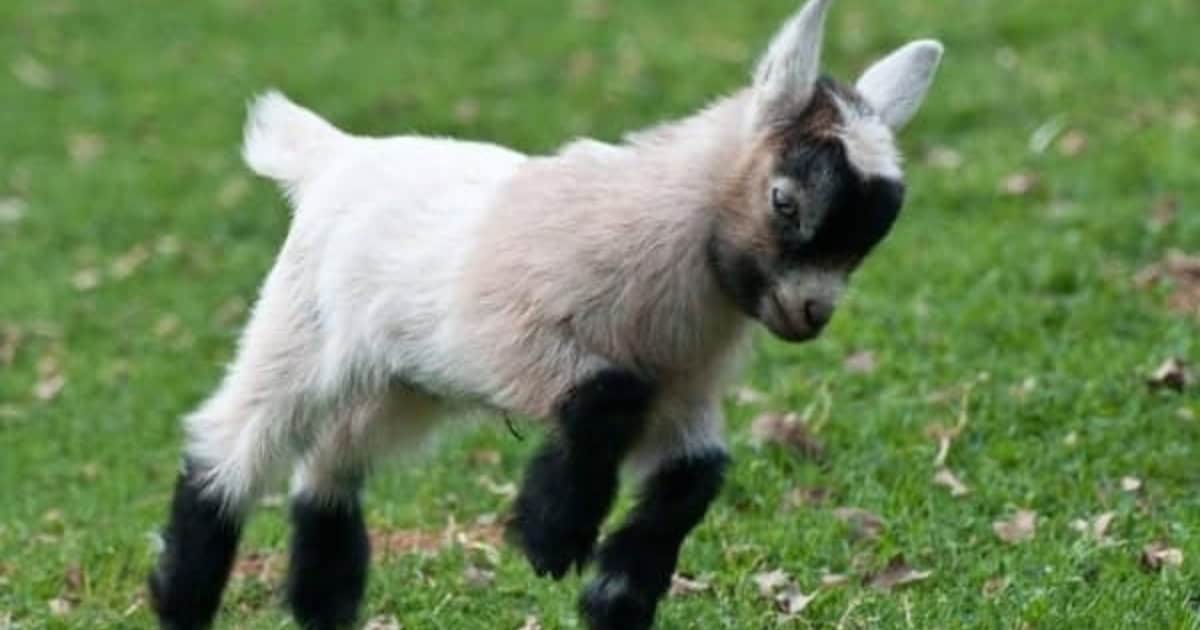
Keeping Your Goats in the Garden
Don’t expect any grass trimming help from your goats like you would with sheep. Goats prefer to eat basically everything else, including trees, vegetables, flowers, and herbs.
A sad thought for any green-thumbs out there! Luckily, they are fantastic weed eaters. Your goats will easily demolish any weeds you have growing, including poison oak and ivy.
The bottom line is that if you have a garden area, herb or veggie patch, or anything you want to stay intact – you’ll need to keep your goats far away.
Keeping your Pygmy goats separate from your garden using a fence or enclosure is an easy way to fix this problem, and your veggies will live to see another day.
Best Kennel / Enclosure for Pygmy Goats
While Pygmy goats can roam around in your fenced backyard during the day, having a kennel or enclosure for them has many benefits.
Having an enclosed sleeping area will keep your goats safe, warm, and happy.
Pygmy goats hate the rain, so you’ll need to have a warm, dry place they can escape too if the weather’s bad.

The Somerzby Double Miniature Goat House (Dog Kennel)
Dog kennels are a popular choice, as these small animals fit easily inside.
Pygmy goats are excellent escape artists and can easily jump over small fences, so the right enclosure will keep them contained.
While keeping your goats in, it’ll also keep predators out.
Stray dogs and cats have been known to attack miniature goats, so keeping them safe is very important in any area.
A sturdy wooden or metal playpen with a roof is also a great idea. Look for something that is designed to keep the animals inside and the predators outside.
What Do They Eat?
Miniature goats will eat grass, weeds, tree branches, hay, grain, and pellets.
A basic diet of hay when supplemented with goat mix is a great choice. We recommend talking to your breeder about the feeding requirements of your goat.
A handful of grains, fruits, and vegetables can all be given every now and then as a treat. Goats need minerals in their diet, so you’ll have to provide a mineral/salt lick year-round.
It’s recommended to keep your feeding and drinking stations clean and elevated off the ground. Goats won’t eat soiled food, so all food given must be clean and untainted.
Fresh drinking water will have to be provided daily. A Pygmy goat will usually drink 7 to 12 litres of water a day.
Care will need to be taken so that your pygmies don’t have access to poisonous plants.
Some plants known to be poisonous to Pygmies include Laburnum, Azaleas, Yew, Alder, Laurel, Walnut, and Rhododendrons.
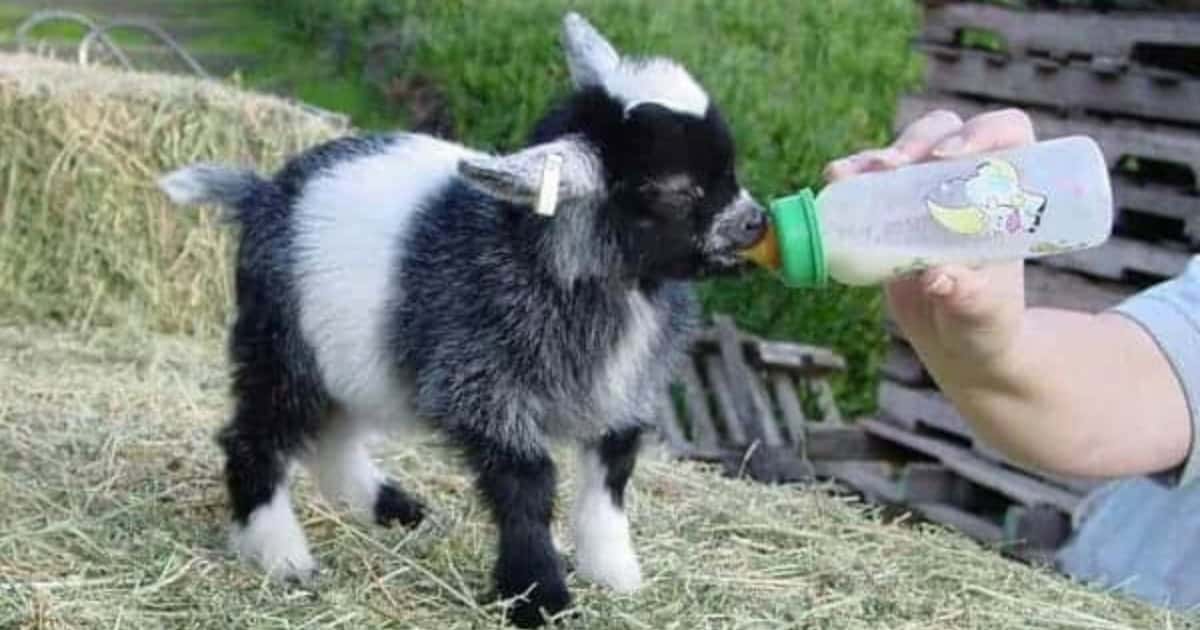
Eating / Milking
Pygmy goats aren’t typically considered a dairy breed. This breed can be milked, but they have small teats and udders which makes it difficult.
They produce milk for around 120-180 days, and typically generate 1 to 2.5 litres a day.
If you’re keeping goats for milk, your doe will have to be bred every year. This means you’ll need to be prepared to either grow your heard or rehome the kid(s).
Pygmy goats are a popular choice for use as a meat goat. Their thick muscles produce excellent meat compared to other miniature goat breeds.
Typically, you’ll just find Pygmy goats as loving family pets.
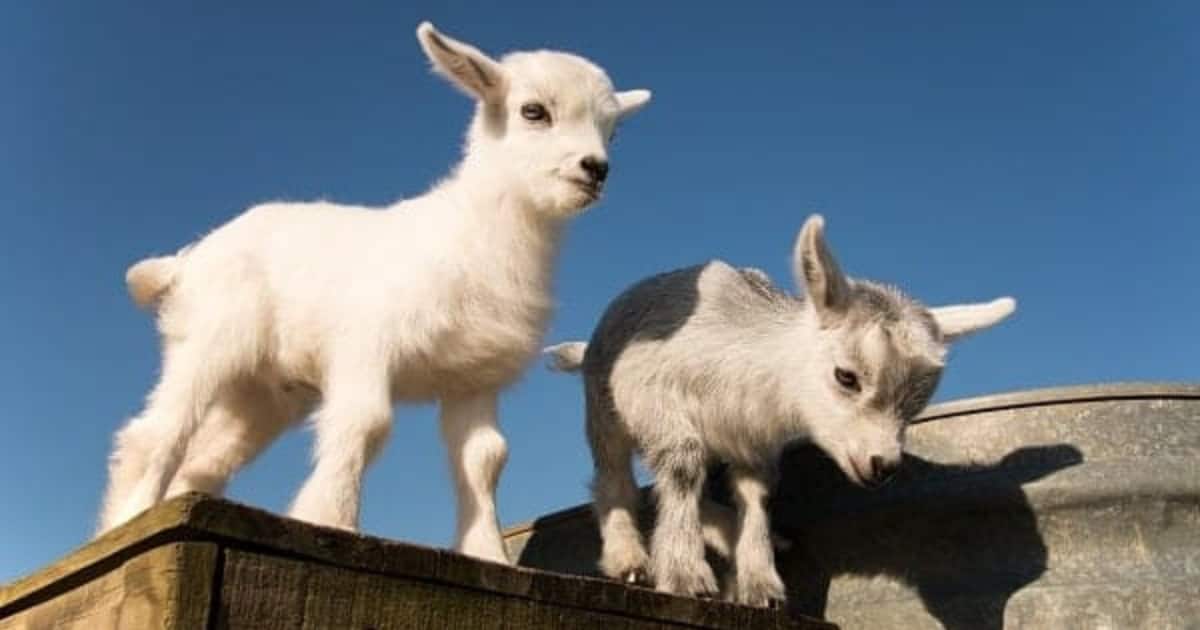
Disease / Health
How to care for your goats
Pygmy goats do require a certain amount of attention to keep them healthy. Regular hoof trimming around every 4 to 8 weeks will need to be performed to keep the animal from going lame.
Since hoof growth varies, check hooves regularly and trim with a trimming tool or sharp pruning shears.
Test your Pygmies for worms at least twice a year, which is done via a Faecal Egg Count.
Routine lice treatment, regular check-ups, and vaccinations will all be needed to keep your goats healthy. The right vet will be able to advise you of any requirements.
Common Diseases or Health Issues
Goats are extremely hardly animals, so diseases are uncommon, but they can occur. It’s always a good idea to talk to your breeder about any past health issues.
Major diseases that can affect all goat breeds are Caprine arthritis encephalitis (CAE) and Johne’s Disease.
You should talk with your prospective breeder about whether they’re regularly testing for these diseases.
Udder infection, or mastitis, is a threat to any lactating doe.
Because doe’s teat openings don’t close straight away after being milked, bacteria can migrate into her udder. Keep your goat’s housing clean to avoid infection.
Keeping your goats properly housed and fed will go a long way to keeping them healthy.
Goats are much less likely to suffer from pneumonia if they’re kept in a well-ventilated, draft-free house. Vaccinations and controlled feeding will also avoid enterotoxemia (overeating disease).
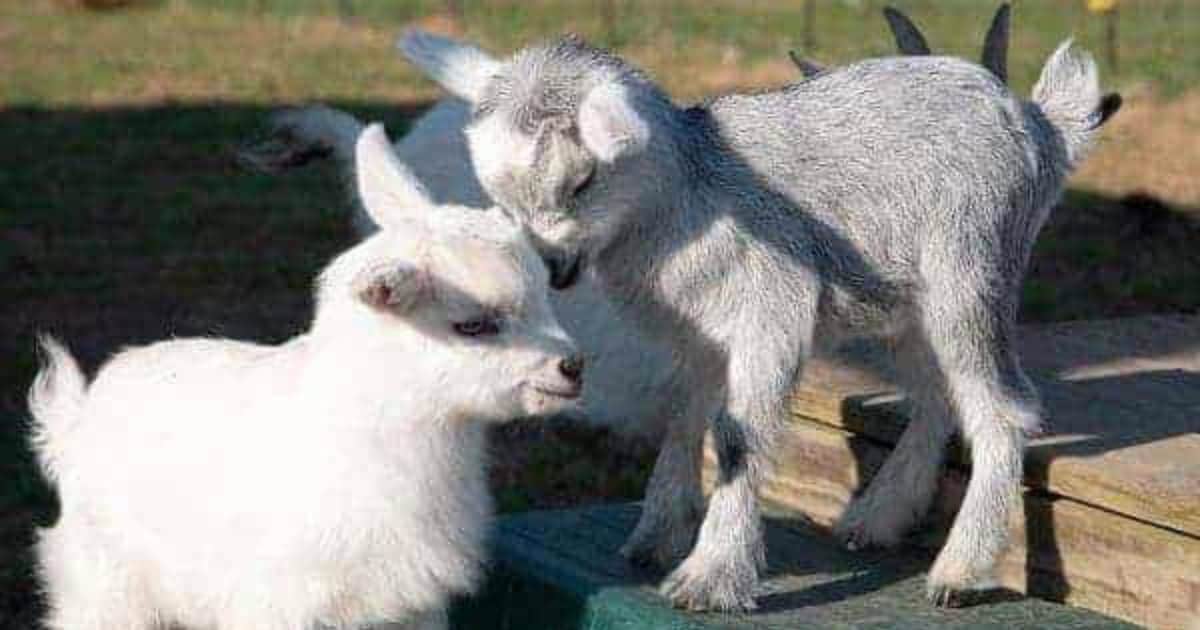
For Sale – Tips on Buying
Decided you want to get some Pygmy goats? There are a few factors to consider during the buying process.
Australian Pygmy Goats have been bred up through a grading system, and pricing will depend on the animal’s specific genetics. Breeders will list what percentage of the Pygmy goat is purebred.
You should also consider what sex you want your pet goat to be.
Bucks are male goats that are typically kept for breeding purposes. They don’t make good pets as they urinate on themselves and become unpredictable in breeding season.
Does are female goats and make excellent pets. They’re very docile and friendly towards other does and wethers. Wethers are de-sexed male goats.
This makes them a better pet, as they’re much more docile and less smelly.
We recommend seeing the animal in person before you purchase it. If this isn’t possible, get some recent photos of the animal as well as height and body condition updates.
This is also a good opportunity to get an idea of the personality of the goat.
If you want a cuddly social goat then interacting with the animal before you purchase will ensure you get what you’re looking for.
The Miniature Goat Breeders Association (MGBA) advises buyers to always make sure the goat is registered and to always get transfer paperwork on the day of purchase.
Breeders in Australia
There are several reputable breeders of Pygmy goats in Australia. Some popular breeders include:
• Arikira, Queensland
• Trinity Pygmy Goats, Victoria
• KawinKidink, Victoria
• Riverstone, Victoria
• Plumbago Mini Goat Stud & Pygmies, Western Australia
• Zodiac Mini Goats, New South Wales
• Petite Bleat, New South Wales
Always research any breeders and make sure that they’re using healthy, ethical practices to raise their goats.
How Much Do They Sell For?
Pygmy goats differ in price according to pedigree, height, number of registered generations, and other factors.
Bucks are usually sold between $550 and $1800. Does are between $350 and $1000. Wethers are sold between $150 and $300.
This price could be much less or much more, depending on where you purchase your goats from.
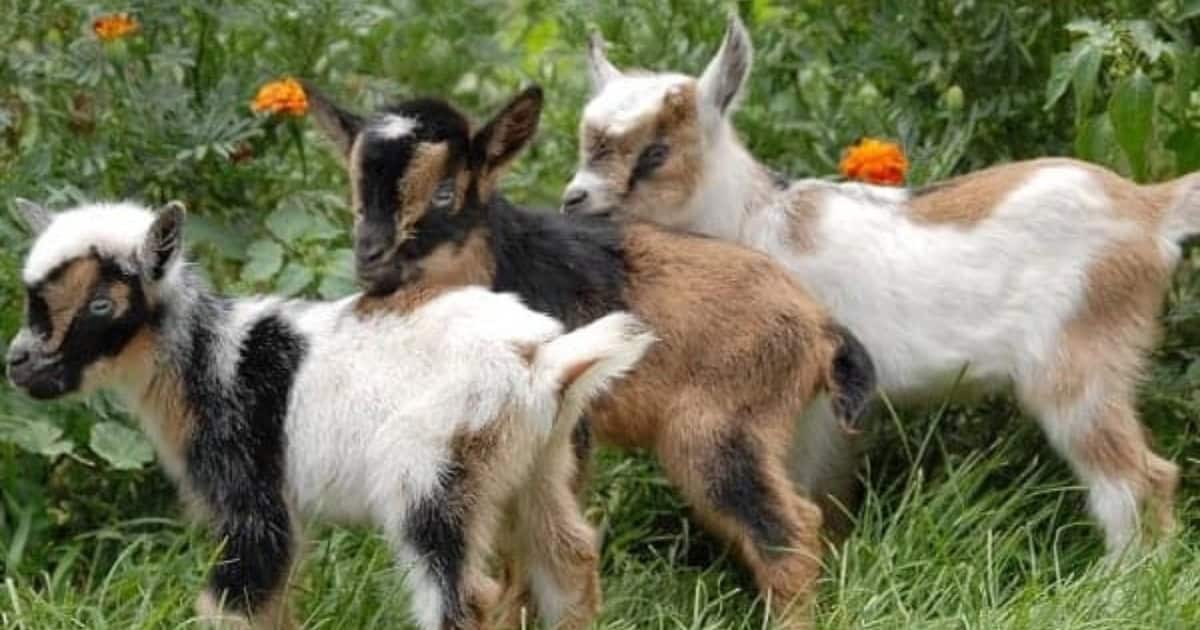
Which Breed Is Right For Me?
Now that you know a bit about Pygmies, you might be wondering if this breed is the best choice for you.
There are two other miniature goat breeds available; the Nigerian Dwarf Goat breed, and the Australian Miniature Goat breed.
Pygmy goats have a stocky, compact body due to their origins as a meat goat. They’re typically smaller than the other two breeds.
Nigerian Dwarf Goat
The Nigerian Dwarf Goat breed is a popular choice for dairy. They produce more milk and have a high butterfat percentage making their milk very sweet.
Because of their dairy abilities, they are usually more expensive than Pygmies.
Australian Miniature Goat
The Australian Miniature Goat breed is considered a “designer breed” with great temperaments and a larger range of coat colours. All three breeds make fantastic family pets.
No matter which miniature goat breed you choose, you can be certain that you’ll be getting a sweet, entertaining, and cheeky pet.
After sharing your lives with them you’ll soon wonder how you ever went without these loveable animals.




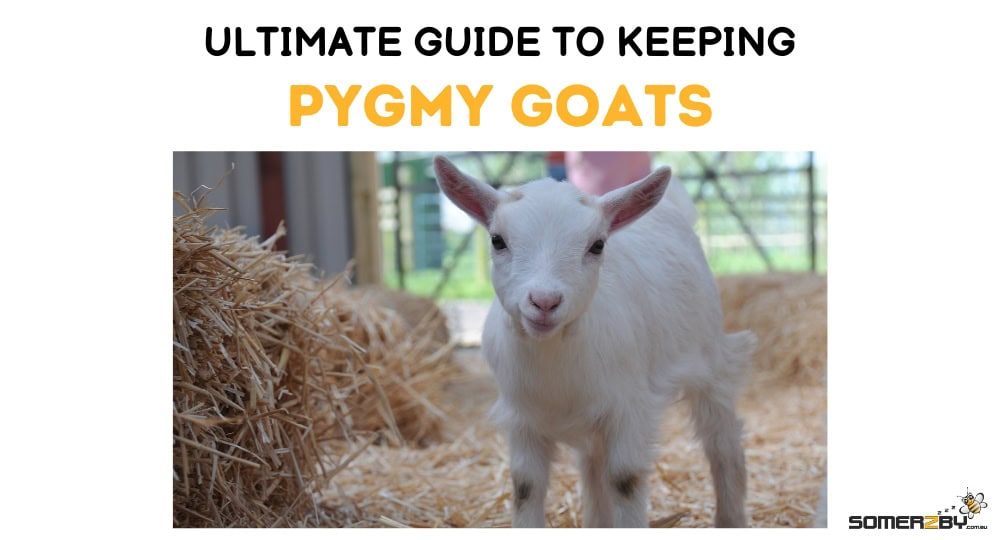
Where can I purchase a mini goat
What state are you in Phillip?
I got one from Kahama Park Pygmy who are on face book. They are in nsw and I highly recommend them. Also would be worth checking gumtree as they are often advertised there.
Where is the best place to get miniature pygmy goats near Heath Ohio?
Any breeders in north Carolina ?? Also supplies an housing an proper fencing??
Where is the closest place to purchase a pygmy goat near Rockholds, Ky.?
Where can i buy one in oklahoma
Hi Jennifer,
Sorry, I don’t know. We are in Australia.
Where can i pay a goat
Are there any breeders near Tooele, Utah?
I’m looking for these Lil guys information Dakota
Pygmy goats are so cute, I would love to have one or two, do you know of any places in Ky. that sales them?
“Sells” them🙄
I have to get one!!
If you read the article you need to get more than one. Goats are herd animals
But alone they are great for the companion of a horse
Just wondering where could i get a pygmy goat on the mid north coast of NSW?
Where can I get a Pygmy goat? I live in MD
Can I get some info on buying these in Qld & also any government restrictions that you are aware of.
I recently got a male pigmy and I love him! Sweetest baby ever.
Where can I purchase one in WA?
Early stage of looking at pigmy’s. How long can they be alone. Can they be potty trained. How much does a non show one cost. How do they compare with a similar small dog. I have to be able to hold it in my lap.
Hello! Can you recommend any breeders for Pygmy goats in Southwest Pennsylvania or surrounding areas? Thank you!
Where can I get a pigmy between Houston and Dallas, Texas?
Hi Amber,
I’m not sure, sorry. We are located in Australia. All the best finding one!
Where can I purchase a pygmy goat in Tennessee or North Carolina?My sister just list one of her goat pets,I want to surprise her with another
Hi,
I am in NSW Australia and have recently been speaking to Scapegoat in east Seaham, Have you heard of them???, and we have one on the way for end of June!! SO EXCITED!!!!
Any Pygmy Goat breeders in FNQ Cairns area ? Thank you
Any Pygmy goat in NSW area?
Cheers !!
I am in NSW Australia . Am looking for a Pygmy Goat breeders
Hi Toni, I have really enjoyed reading your helpful article. I have been wanting to have a couple of pigmy goats for about 20 plus years! Could you advise me on how much outside space I would need for two pigmies? Also, are there any breeders you would recommend in South West England? (I realise it’s a long way from Australia! But maybe you know some?)
Thank you so much
Oh they’re HARDLY? Mmmmmmkay 😃
I absolutely loved this guide on keeping pygmy goats as pets! The tips on their care and social needs were super helpful. I’ve been considering adding a few to our homestead, and this post has given me the confidence to take the plunge. Thanks for sharing such valuable information!